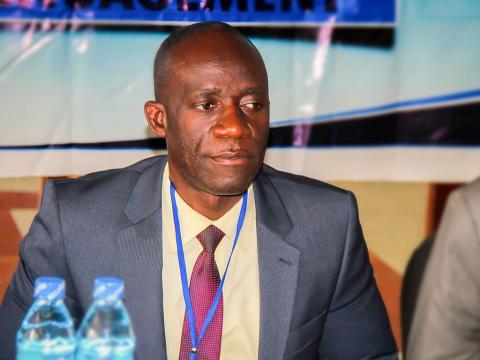Nasratu Kargbo
The Director General of the Electricity and Water Regulatory Commission Dr. Emmanuel Mannah has told journalists during the weekly press briefing at the Ministry of Information and Communications on the 14th October 2021 that the commission has vetted 120 sachet water producing companies, though he however noted that there are still others operating without scrutiny.
He explained that two years back the country had over three hundred water companies in the country. Mannah explained how the sector is still faced with challenges, noting that there are still many other water companies which are not vetted, most of which the Director General said operate at night.
He explained of EWRC having signed an MOU with the Inspector General of Police, in order to monitor water companies and ensure that whenever they go into the field and needed to arrest certain individuals, the Police will be there.
The Director Economic Regulation for EWRC Brima Bah explained that it is the commission’s mandate to approve tariffs for both electricity and water sectors. Speaking on tariffs for the sachet water companies, he said they regulate tariff for whole sales, which is the price which the retailers buy from the companies.
Describing the filing process for tariffs , Bah explained that when SALWACO, EDSA or Guma apply for a tariff, they are given forms to fill after which it is returned with a formal application letter, thereafter the commission will make sure the procedures are met.
He said the Commission then informs the public about the tariff request made by the company and then makes a publication for three weeks , allowing the public and stakeholders to make input with regards the tariffs being proposed. He added that after the three week period, a public hearing will be held where all major stakeholders and the public will give an opportunity to the company to make a presentation justifying the reason for the tariff.
Acting Deputy Director Sesay on the process of issuing license stated that the commission is the last stop in the licensing process. H explained that the commission requires a new water factory must have to go through the Ministry of Health and Sanitation for registration, which will in turn have to make sure the company has a proper sanitary condition in place.
The company is also required to get a certificate from the Factories Inspectorate which is there to ensure that the water producing entity meets the required standard. A water testing certificate is also needed from the Standards Bureau or any other approved water testing to ascertain that the water is good enough for human consumption. After all of the above, the factory would then go to the EWRC which checks all documents and ensure all procedures are met.
Copyright © Politico Online 15/10/21








